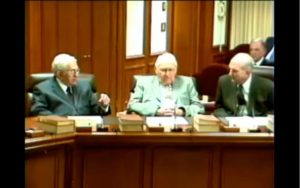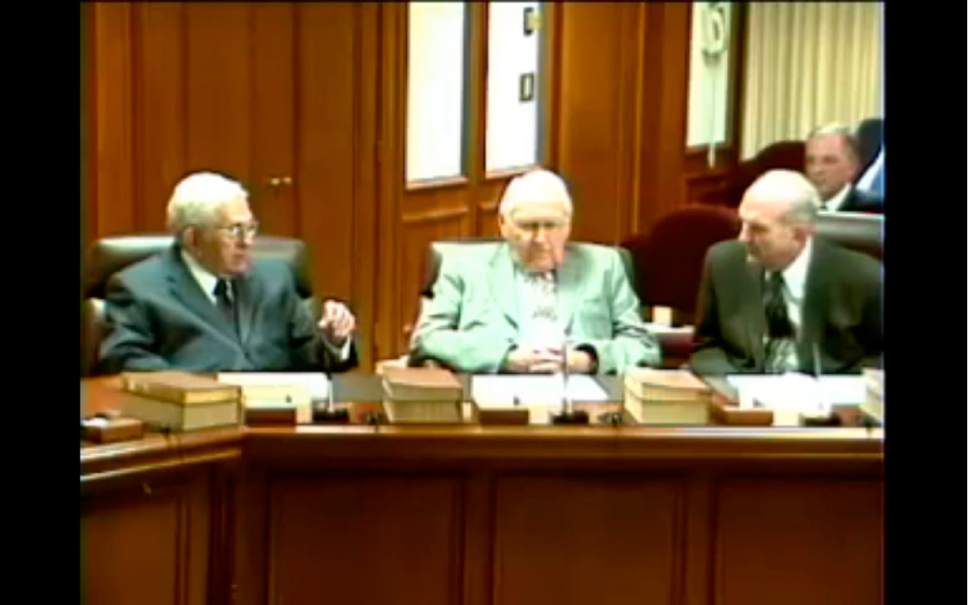 On October 2nd 2016, the final day of the LDS Church’s October General Conference, a dozen or so videos were leaked online that show the briefings of various topics given to the church’s top leadership, and one of a general staff meeting of the Church History Department. All videos were from 2007 to 2012, and all were officially recorded by the church for record keeping purposes as well as for viewing by those in these leading groups who may not have been present. The videos range from just a few minutes in length to an hour or longer, with topics as diverse as updates about marijuana legislation and on world affairs, to new scientific findings that challenge the notion of human’s having “consciences,” to Wikileaks (including warnings to leaders about the church’s own vulnerabilities), to how to hold onto the Church’s single young adults, to religious freedom, and also the Church’s influence in the U.S. Congress. In addition to presentations, the videos show various exchanges among members of the Quorum of the Twelve as well as with the presenters.
On October 2nd 2016, the final day of the LDS Church’s October General Conference, a dozen or so videos were leaked online that show the briefings of various topics given to the church’s top leadership, and one of a general staff meeting of the Church History Department. All videos were from 2007 to 2012, and all were officially recorded by the church for record keeping purposes as well as for viewing by those in these leading groups who may not have been present. The videos range from just a few minutes in length to an hour or longer, with topics as diverse as updates about marijuana legislation and on world affairs, to new scientific findings that challenge the notion of human’s having “consciences,” to Wikileaks (including warnings to leaders about the church’s own vulnerabilities), to how to hold onto the Church’s single young adults, to religious freedom, and also the Church’s influence in the U.S. Congress. In addition to presentations, the videos show various exchanges among members of the Quorum of the Twelve as well as with the presenters.
The videos have created a stir among many Latter-day Saint discussion groups, causing some consternation for some, reasons for optimism among others–and typically a bit of both. In this episode, three keen observers of the church and discussions among various constituencies, Boyd Jay Petersen, Kristy Money, and Mark Crego, join Mormon Matters host Dan Wotherspoon for an overview of the videos and the discussions, especially noting themes, purposes, and inter-personal and other dynamics they see at play in the videos and among those speaking in them. They also speak extensively about the many ways in which what we view in the videos, including much of the participants’ rhetoric, are very similar to what goes on in business board rooms.
The panel raises a lot of issues, but we know there are more! Please join in the discussion below!
________
Links:
“Leaked Videos Show Mormon Apostles Discussing Political Influence, Gay Marriage, Marijuana, and More,” Salt Lake Tribune, October 2, 2016
MormonLeaks on YouTube (can view the videos there)
“Gems from the Leaked Videos…” (ex-Mormon reddit that has links to the videos plus time-codes for going right to particular spots)
“Ryan McKnight on MormonLeaks and the Underground Handcart Company,” Mormon Transitions podcast, October 4, 2016


Comments 8
My big take away from watching these videos are how “out of touch” they are with reality, with real people. If you think about it, they are only surrounded by other members of the Church who believe and feel the same way they do (only the higher ups surround them in a bubble). They do not interact with non-members, inactive members and especially gay people. We are in 2016 and anyone who still believe there is a “Gay agenda” need to take real hard look at reality. Gay people are people, who happen to be born gay. God did not make a “mistake”. This is not their “burden” that they must overcome. it is NOT like alcoholism. In fact, there is no gay agenda. I get tired of people believing that, it is blatantly false. The only thing gay people want is to be treated like everyone else. It would serve the ‘brethren” to sit with gay people, listen to what they have to say, feel their “spirits”. Gay people are normal, hardworking, children of God who deserve respect and Christ like love and not being demonized because of who they are, how they were born. If this is Christ’s Church, I am pretty certain that is what he would do, make some gay friends. Brethren?
In the podcast, Dan mentions an interview with Marlin Jensen by Doug Fabrizio. Searching for it online, it looks like that may have been part of the Dialogue 50th anniversary program. Is there a recording of that available anywhere? I’d love to hear it.
Author
I don’t think they filmed the Fabrizio interview (with Marlin Jensen, Christine Durham, and Darius Gray) at the dinner event, but they did record the sessions of the conference earlier that day, including this one (linked here) with Greg Prince and Marlin Jensen. I think you’ll enjoy it. Cheers! Dan
https://www.dialoguejournal.com/2016/special-dialogue-podcast-spirit-of-dialogue-conference-session-7/
Thanks!
I don’t think these particular videos revealed leaders who are anxious to learn or engage with outside issues.
I just can’t help but think the “top-down” approach and the insularity/uniformity is harmful to the goal of creating “God’s kingdom on earth.” Jesus didn’t hang out with the other church leaders of his day, or just dispatch a flank of “warrior” missionaries. He engaged with people where they were–he himself left the ninety-and-nine to go after the one. (more like Pope Francis?)
These corporate style briefings allow the leaders to have a level of detachment from those they serve. They would be better served if, for example, they (not just Marlin Jensen or Todd Christofferson) attended an Affirmation meeting, or invited Affirmation members to a meeting. How can one be sure they are making correct decisions or even approaching God with the best/right questions if one hasn’t engaged personally with the full spectrum of human experience?
I think the Prop 8 campaign just repeated the same mistakes–or even worse mistakes–as with the priesthood ban, by trying to rationalize, create reasons for/justify the policy stance. As a parent I was infuriated that my children were taught lessons in seminary and the 3rd hour of the Sunday block about Prop 8. Leaders were definitely trying to recruit them to be “soldiers” in the “war.” (Though they were too young to vote)
Dan, Did Kristy ever provide you with a link to her references for the historical usage of the term “church broke”? That is a fascinating term and I would like to know more. Thank you.
Author
She didn’t, and I searched the larger blogs and couldn’t really find one that matched. I’ll re-ask her. The closest I could find is this one by hawkgrrrl at Wheat and Tares: https://wheatandtares.org/2016/10/03/church-broke/
It doesn’t really take an historical look, but one commenter said this: “My first wife worked at the COB back in the 70’s and used the term to refer to people that could work around the GA’s and still believe the church was true.” That’s about all I could spot that suggests it’s a term with a long history within church governance.
Author
A line from a Religious Educator article by Chauncey Riddle has this line: “This phenomenon of accepting priesthood authority as part of faith in Jesus Christ is somewhat jokingly in the church called being “priesthood broke,” the western term referring to a horse being broken to be manageable and rideable. Those who have true faith in Christ wear the priesthood harness well they do their assignments well; they support those in authority over them; they minister to those under their priesthood authority; and they strive to bring all humans to christ both by precept and by example.”
Here is the link to the whole piece:
https://ojs.lib.byu.edu/spc/index.php/RelEd/article/viewFile/1907/1868
Thanks Kristy and Gina Colvin for alerting me to this instance of its use, and referring to it being at least something that this professor has heard enough of in church circles to refer to it being used “somewhat jokingly.”